

Concept Papers in Research: Deciphering the blueprint of brilliance
Concept papers hold significant importance as a precursor to a full-fledged research proposal in academia and research. Understanding the nuances and significance of a concept paper is essential for any researcher aiming to lay a strong foundation for their investigation.
Table of Contents
What Is Concept Paper
A concept paper can be defined as a concise document which outlines the fundamental aspects of a grant proposal. It outlines the initial ideas, objectives, and theoretical framework of a proposed research project. It is usually two to three-page long overview of the proposal. However, they differ from both research proposal and original research paper in lacking a detailed plan and methodology for a specific study as in research proposal provides and exclusion of the findings and analysis of a completed research project as in an original research paper. A concept paper primarily focuses on introducing the basic idea, intended research question, and the framework that will guide the research.
Purpose of a Concept Paper
A concept paper serves as an initial document, commonly required by private organizations before a formal proposal submission. It offers a preliminary overview of a project or research’s purpose, method, and implementation. It acts as a roadmap, providing clarity and coherence in research direction. Additionally, it also acts as a tool for receiving informal input. The paper is used for internal decision-making, seeking approval from the board, and securing commitment from partners. It promotes cohesive communication and serves as a professional and respectful tool in collaboration.
These papers aid in focusing on the core objectives, theoretical underpinnings, and potential methodology of the research, enabling researchers to gain initial feedback and refine their ideas before delving into detailed research.
Key Elements of a Concept Paper
Key elements of a concept paper include the title page , background , literature review , problem statement , methodology, timeline, and references. It’s crucial for researchers seeking grants as it helps evaluators assess the relevance and feasibility of the proposed research.
Writing an effective concept paper in academic research involves understanding and incorporating essential elements:
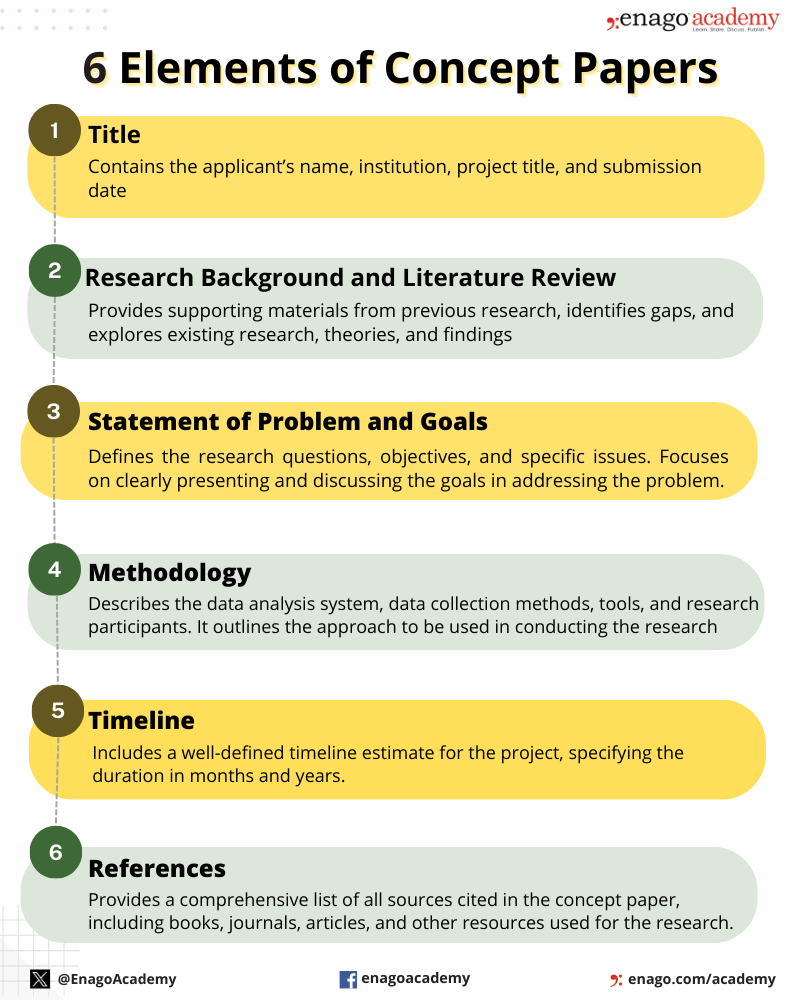
How to Write a Concept Paper?
To ensure an effective concept paper, it’s recommended to select a compelling research topic, pose numerous research questions and incorporate data and numbers to support the project’s rationale. The document must be concise (around five pages) after tailoring the content and following the formatting requirements. Additionally, infographics and scientific illustrations can enhance the document’s impact and engagement with the audience. The steps to write a concept paper are as follows:
1. Write a Crisp Title:
Choose a clear, descriptive title that encapsulates the main idea. The title should express the paper’s content. It should serve as a preview for the reader.
2. Provide a Background Information:
Give a background information about the issue or topic. Define the key terminologies or concepts. Review existing literature to identify the gaps your concept paper aims to fill.
3. Outline Contents in the Introduction:
Introduce the concept paper with a brief overview of the problem or idea you’re addressing. Explain its significance. Identify the specific knowledge gaps your research aims to address and mention any contradictory theories related to your research question.
4. Define a Mission Statement:
The mission statement follows a clear problem statement that defines the problem or concept that need to be addressed. Write a concise mission statement that engages your research purpose and explains why gaining the reader’s approval will benefit your field.
5. Explain the Research Aim and Objectives:
Explain why your research is important and the specific questions you aim to answer through your research. State the specific goals and objectives your concept intends to achieve. Provide a detailed explanation of your concept. What is it, how does it work, and what makes it unique?
6. Detail the Methodology:
Discuss the research methods you plan to use, such as surveys, experiments, case studies, interviews, and observations. Mention any ethical concerns related to your research.
7. Outline Proposed Methods and Potential Impact:
Provide detailed information on how you will conduct your research, including any specialized equipment or collaborations. Discuss the expected results or impacts of implementing the concept. Highlight the potential benefits, whether social, economic, or otherwise.
8. Mention the Feasibility
Discuss the resources necessary for the concept’s execution. Mention the expected duration of the research and specific milestones. Outline a proposed timeline for implementing the concept.
9. Include a Support Section:
Include a section that breaks down the project’s budget, explaining the overall cost and individual expenses to demonstrate how the allocated funds will be used.
10. Provide a Conclusion:
Summarize the key points and restate the importance of the concept. If necessary, include a call to action or next steps.
Although the structure and elements of a concept paper may vary depending on the specific requirements, you can tailor your document based on the guidelines or instructions you’ve been given.
Here are some tips to write a concept paper:
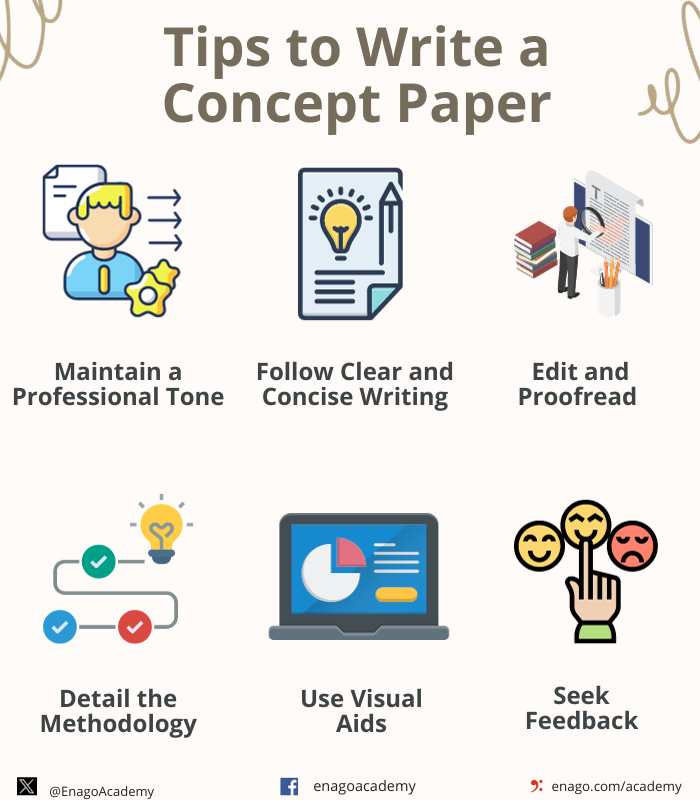
Example of a Concept Paper
Here is an example of a concept paper. Please note, this is a generalized example. Your concept paper should align with the specific requirements, guidelines, and objectives you aim to achieve in your proposal. Tailor it accordingly to the needs and context of the initiative you are proposing.
Download Now!
Importance of a Concept Paper
Concept papers serve various fields, influencing the direction and potential of research in science, social sciences, technology, and more. They contribute to the formulation of groundbreaking studies and novel ideas that can impact societal, economic, and academic spheres.
A concept paper serves several crucial purposes in various fields:
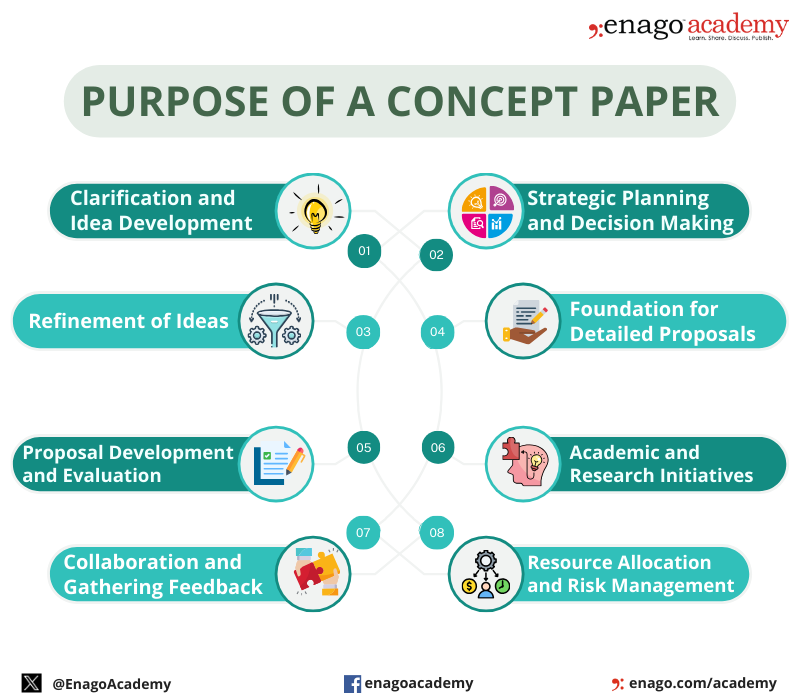
In summary, a well-crafted concept paper is essential in outlining a clear, concise, and structured framework for new ideas or proposals. It helps in assessing the feasibility, viability, and potential impact of the concept before investing significant resources into its implementation.
How well do you understand concept papers? Test your understanding now!
Fill the Details to Check Your Score

Role of AI in Writing Concept Papers
The increasing use of AI, particularly generative models, has facilitated the writing process for concept papers. Responsible use involves leveraging AI to assist in ideation, organization, and language refinement while ensuring that the originality and ethical standards of research are maintained.
AI plays a significant role in aiding the creation and development of concept papers in several ways:
1. Idea Generation and Organization
AI tools can assist in brainstorming initial ideas for concept papers based on key concepts. They can help in organizing information, creating outlines, and structuring the content effectively.
2. Summarizing Research and Data Analysis
AI-powered tools can assist in conducting comprehensive literature reviews, helping writers to gather and synthesize relevant information. AI algorithms can process and analyze vast amounts of data, providing insights and statistics to support the concept presented in the paper.
3. Language and Style Enhancement
AI grammar checker tools can help writers by offering grammar, style, and tone suggestions, ensuring professionalism. It can also facilitate translation, in case a global collaboration.
4. Collaboration and Feedback
AI platforms offer collaborative features that enable multiple authors to work simultaneously on a concept paper, allowing for real-time contributions and edits.
5. Customization and Personalization
AI algorithms can provide personalized recommendations based on the specific requirements or context of the concept paper. They can assist in tailoring the concept paper according to the target audience or specific guidelines.
6. Automation and Efficiency
AI can automate certain tasks, such as citation formatting, bibliography creation, or reference checking, saving time for the writer.
7. Analytics and Prediction
AI models can predict potential outcomes or impacts based on the information provided, helping writers anticipate the possible consequences of the proposed concept.
8. Real-Time Assistance
AI-driven chat-bots can provide real-time support and answers to specific questions related to the concept paper writing process.
AI’s role in writing concept papers significantly streamlines the writing process, enhances the quality of the content, and provides valuable assistance in various stages of development, contributing to the overall effectiveness of the final document.
Concept papers serve as the stepping stone in the research journey, aiding in the crystallization of ideas and the formulation of robust research proposals. It the cornerstone for translating ideas into impactful realities. Their significance spans diverse domains, from academia to business, enabling stakeholders to evaluate, invest, and realize the potential of groundbreaking concepts.
Frequently Asked Questions
A concept paper can be defined as a concise document outlining the fundamental aspects of a grant proposal such as the initial ideas, objectives, and theoretical framework of a proposed research project.
A good concept paper should offer a clear and comprehensive overview of the proposed research. It should demonstrate a strong understanding of the subject matter and outline a structured plan for its execution.
Concept paper is important to develop and clarify ideas, develop and evaluate proposal, inviting collaboration and collecting feedback, presenting proposals for academic and research initiatives and allocating resources.
I got wonderful idea
It helps a lot for my concept paper.
Rate this article Cancel Reply
Your email address will not be published.

Enago Academy's Most Popular Articles

- Reporting Research
Academic Essay Writing Made Simple: 4 types and tips
The pen is mightier than the sword, they say, and nowhere is this more evident…
![concept paper for education What is Academic Integrity and How to Uphold it [FREE CHECKLIST]](https://www.enago.com/academy/wp-content/uploads/2024/05/FeatureImages-59-210x136.png)
Ensuring Academic Integrity and Transparency in Academic Research: A comprehensive checklist for researchers
Academic integrity is the foundation upon which the credibility and value of scientific findings are…

- AI in Academia
AI vs. AI: How to detect image manipulation and avoid academic misconduct
The scientific community is facing a new frontier of controversy as artificial intelligence (AI) is…

- Diversity and Inclusion
Need for Diversifying Academic Curricula: Embracing missing voices and marginalized perspectives
In classrooms worldwide, a single narrative often dominates, leaving many students feeling lost. These stories,…

- Career Corner
- Trending Now
Recognizing the signs: A guide to overcoming academic burnout
As the sun set over the campus, casting long shadows through the library windows, Alex…

Sign-up to read more
Subscribe for free to get unrestricted access to all our resources on research writing and academic publishing including:
- 2000+ blog articles
- 50+ Webinars
- 10+ Expert podcasts
- 50+ Infographics
- 10+ Checklists
- Research Guides
We hate spam too. We promise to protect your privacy and never spam you.
I am looking for Editing/ Proofreading services for my manuscript Tentative date of next journal submission:

As a researcher, what do you consider most when choosing an image manipulation detector?

Community Blog
Keep up-to-date on postgraduate related issues with our quick reads written by students, postdocs, professors and industry leaders.
What is a Concept Paper and How do You Write One?
- By DiscoverPhDs
- August 26, 2020

What is a Concept Paper?
A concept paper is a short document written by a researcher before starting their research project, with the purpose of explaining what the study is about, why it is important and the methods that will be used.
The concept paper will include your proposed research title, a brief introduction to the subject, the aim of the study, the research questions you intend to answer, the type of data you will collect and how you will collect it. A concept paper can also be referred to as a research proposal.
What is the Purpose of a Concept Paper?
The primary aim of a research concept paper is to convince the reader that the proposed research project is worth doing. This means that the reader should first agree that the research study is novel and interesting. They should be convinced that there is a need for this research and that the research aims and questions are appropriate.
Finally, they should be satisfied that the methods for data collection proposed are feasible, are likely to work and can be performed within the specific time period allocated for this project.
The three main scenarios in which you may need to write a concept paper are if you are:
- A final year undergraduate or master’s student preparing to start a research project with a supervisor.
- A student submitting a research proposal to pursue a PhD project under the supervision of a professor.
- A principal investigator submitting a proposal to a funding body to secure financial support for a research project.
How Long is a Concept Paper?
The concept paper format is usually between 2 and 3 pages in length for students writing proposals for undergraduate, master’s or PhD projects. Concept papers written as part of funding applications may be over 20 pages in length.
How do you Write a Concept Paper?
There are 6 important aspects to consider when writing a concept paper or research proposal:
- 1. The wording of the title page, which is best presented as a question for this type of document. At this study concept stage, you can write the title a bit catchier, for example “Are 3D Printed Engine Parts Safe for Use in Aircraft?”.
- A brief introduction and review of relevant existing literature published within the subject area and identification of where the gaps in knowledge are. This last bit is particularly important as it guides you in defining the statement of the problem. The concept paper should provide a succinct summary of ‘the problem’, which is usually related to what is unknown or poorly understood about your research topic . By the end of the concept paper, the reader should be clear on how your research idea will provide a ‘solution’ to this problem.
- The overarching research aim of your proposed study and the objectives and/or questions you will address to achieve this aim. Align all of these with the problem statement; i.e. write each research question as a clear response to addressing the limitations and gaps identified from previous literature. Also give a clear description of your primary hypothesis.
- The specific data outputs that you plan to capture. For example, will this be qualitative or quantitative data? Do you plan to capture data at specific time points or at other defined intervals? Do you need to repeat data capture to asses any repeatability and reproducibility questions?
- The research methodology you will use to capture this data, including any specific measurement or analysis equipment and software you will use, and a consideration of statistical tests to help interpret the data. If your research requires the use of questionnaires, how will these be prepared and validated? In what sort of time frame would you plan to collect this data?
- Finally, include a statement of the significance of the study , explaining why your research is important and impactful. This can be in the form of a concluding paragraph that reiterate the statement of the problem, clarifies how your research will address this and explains who will benefit from your research and how.
You may need to include a short summary of the timeline for completing the research project. Defining milestones of the time points at which you intend to complete certain tasks can help to show that you’ve considered the practicalities of running this study. It also shows that what you have proposed is feasible in order to achieve your research goal.
If you’re pitching your proposed project to a funder, they may allocate a proportion of the money based on the satisfactory outcome of each milestone. These stakeholders may also be motivated by knowing that you intend to convert your dissertation into an article for journal publication; this level of dissemination is of high importance to them.
Additionally, you may be asked to provide a brief summary of the projected costs of running the study. For a PhD project this could be the bench fees associated with consumables and the cost of any travel if required.
Make sure to include references and cite all other literature and previous research that you discuss in your concept paper.
This guide gave you an overview of the key elements you need to know about when writing concept papers. The purpose of these are first to convey to the reader what your project’s purpose is and why your research topic is important; this is based on the development of a problem statement using evidence from your literature review.
Explain how it may positively impact your research field and if your proposed research design is appropriate and your planned research method achievable.

A science investigatory project is a science-based research project or study that is performed by school children in a classroom, exhibition or science fair.

Thinking about applying to a PhD? Then don’t miss out on these 4 tips on how to best prepare your application.

A well written figure legend will explain exactly what a figure means without having to refer to the main text. Our guide explains how to write one.
Join thousands of other students and stay up to date with the latest PhD programmes, funding opportunities and advice.

Browse PhDs Now

This post explains the difference between the journal paper status of In Review and Under Review.

You’ll come across many academics with PhD, some using the title of Doctor and others using Professor. This blog post helps you understand the differences.

Prof Raghupathi gained his PhD in Biochemistry and Molecular Biology from Virginia Commonwealth University in 1991. He is now a professor in the Department of Neurobiology & Anatomy at Drexel University College of Medicine.

De-Shaine is 2nd Year Neurotechnology PhD Student at Imperial College London. His research looks at monitoring the brain when it’s severely injured after a traumatic brain injury or stroke and patients are in neurocritical care.
Join Thousands of Students
How To Write a Concept Paper for Academic Research: An Ultimate Guide
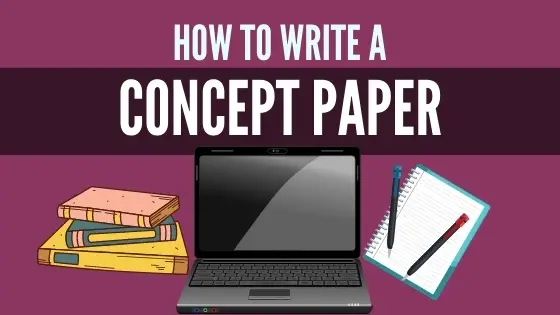
A concept paper is one of the first steps in helping you fully realize your research project. Because of this, some schools opt to teach students how to write concept papers as early as high school. In college, professors sometimes require their students to submit concept papers before suggesting their research projects to serve as the foundations for their theses.
If you’re reading this right now, you’ve probably been assigned by your teacher or professor to write a concept paper. To help you get started, we’ve prepared a comprehensive guide on how to write a proper concept paper.
Related: How to Write Significance of the Study (with Examples)
Table of Contents
What is the concept paper, 1. academic research concept papers, 2. advertising concept papers, 3. research grant concept papers, concept paper vs. research proposal, tips for finding your research topic, 2. think of research questions that you want to answer in your project, 3. formulate your research hypothesis, 4. plan out how you will achieve, analyze, and present your data, 2. introduction, 3. purpose of the study, 4. preliminary literature review, 5. objectives of the study, 6. research questions and hypotheses, 7. proposed methodology, 8. proposed research timeline, 9. references, sample concept paper for research proposal (pdf), tips for writing your concept paper.
Generally, a concept paper is a summary of everything related to your proposed project or topic. A concept paper indicates what the project is all about, why it’s important, and how and when you plan to conduct your project.
Different Types of the Concept Paper and Their Uses

This type of concept paper is the most common type and the one most people are familiar with. Concept papers for academic research are used by students to provide an outline for their prospective research topics.
These concept papers are used to help students flesh out all the information and ideas related to their topic so that they may arrive at a more specific research hypothesis.
Since this is the most common type of concept paper, it will be the main focus of this article.
Advertising concept papers are usually written by the creative and concept teams in advertising and marketing agencies.
Through a concept paper, the foundation or theme for an advertising campaign or strategy is formed. The concept paper can also serve as a bulletin board for ideas that the creative and concept teams can add to or develop.
This type of concept paper usually discusses who the target audience of the campaign is, what approach of the campaign will be, how the campaign will be implemented, and the projected benefits and impact of the campaign to the company’s sales, consumer base, and other aspects of the company.
This type of concept paper is most common in the academe and business world. Alongside proving why your research project should be conducted, a research grant concept paper must also appeal to the company or funding agency on why they should be granted funds.
The paper should indicate a proposed timeline and budget for the entire project. It should also be able to persuade the company or funding agency on the benefits of your research project– whether it be an increase in sales or productivity or for the benefit of the general public.
It’s important to discuss the differences between the two because a lot of people often use these terms interchangeably.
A concept paper is one of the first steps in conducting a research project. It is during this process that ideas and relevant information to the research topic are gathered to produce the research hypothesis. Thus, a concept paper should always precede the research proposal.
A research proposal is a more in-depth outline of a more fleshed-out research project. This is the final step before a researcher can conduct their research project. Although both have similar elements and structures, a research proposal is more specific when it comes to how the entire research project will be conducted.
Getting Started on Your Concept Paper
1. find a research topic you are interested in.
When choosing a research topic, make sure that it is something you are passionate about or want to learn more about. If you are writing one for school, make sure it is still relevant to the subject of your class. Choosing a topic you aren’t invested in may cause you to lose interest in your project later on, which may lower the quality of the research you’ll produce.
A research project may last for months and even years, so it’s important that you will never lose interest in your topic.
- Look for inspiration everywhere. Take a walk outside, read books, or go on your computer. Look around you and try to brainstorm ideas about everything you see. Try to remember any questions you might have asked yourself before like why something is the way it is or why can’t this be done instead of that .
- Think big. If you’re having trouble thinking up a specific topic to base your research project on, choosing a broad topic and then working your way down should help.
- Is it achievable? A lot of students make the mistake of choosing a topic that is hard to achieve in terms of materials, data, and/or funding available. Before you decide on a research topic, make sure you consider these aspects. Doing so will save you time, money, and effort later on.
- Be as specific as can be. Another common mistake that students make is that they sometimes choose a research topic that is too broad. This results in extra effort and wasted time while conducting their research project. For example: Instead of “The Effects of Bananas on Hungry Monkeys” , you could specify it to “The Effects of Cavendish Bananas on Potassium-deficiency in Hungry Philippine Long-tailed Macaques in Palawan, Philippines”.
Now that you have a general idea of the topic of your research project, you now need to formulate research questions based on your project. These questions will serve as the basis for what your project aims to answer. Like your research topic, make sure these are specific and answerable.
Following the earlier example, possible research questions could be:
- Do Cavendish bananas produce more visible effects on K-deficiency than other bananas?
- How susceptible are Philippine long-tailed macaques to K-deficiency?
- What are the effects of K-deficiency in Philippine long-tailed macaques?
After formulating the research questions, you should also provide your hypothesis for each question. A research hypothesis is a tentative answer to the research problem. You must provide educated answers to the questions based on your existing knowledge of the topic before you conduct your research project.
After conducting research and collecting all of the data into the final research paper, you will then have to approve or disprove these hypotheses based on the outcome of the project.
Prepare a plan on how to acquire the data you will need for your research project. Take note of the different types of analysis you will need to perform on your data to get the desired results. Determine the nature of the relationship between different variables in your research.
Also, make sure that you are able to present your data in a clear and readable manner for those who will read your concept paper. You can achieve this by using tables, charts, graphs, and other visual aids.
Related: How to Make Conceptual Framework (with Examples and Templates)
Generalized Structure of a Concept Paper
Since concept papers are just summaries of your research project, they are usually short and no longer than 5 pages. However, for big research projects, concept papers can reach up to more than 20 pages.
Your teacher or professor may give you a certain format for your concept papers. Generally, most concept papers are double-spaced and are less than 500 words in length.
Even though there are different types of concept papers, we’ve provided you with a generalized structure that contains elements that can be found in any type of concept paper.
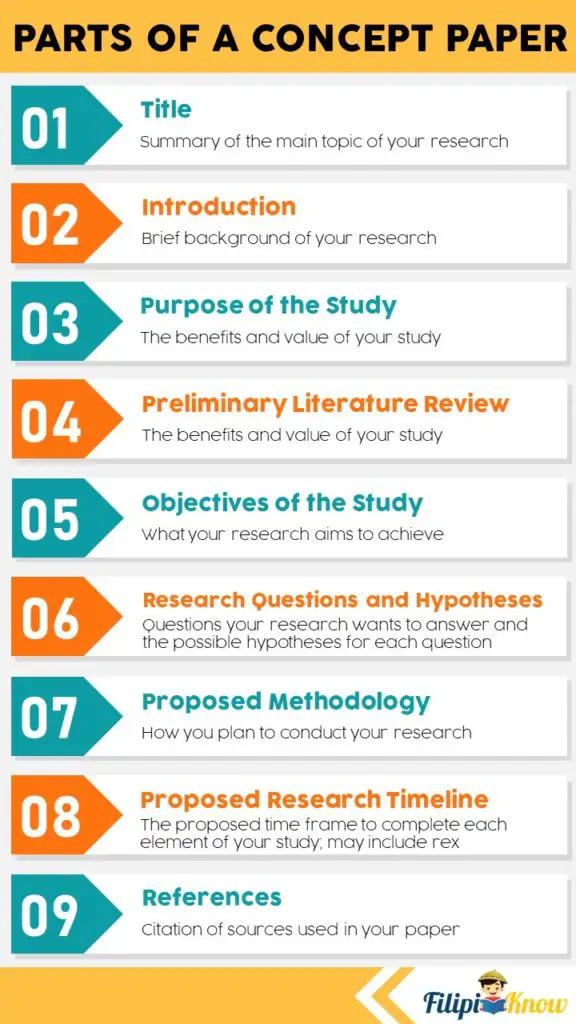
The title for your paper must be able to effectively summarize what your research is all about. Use simple words so that people who read the title of your research will know what it’s all about even without reading the entire paper.
The introduction should give the reader a brief background of the research topic and state the main objective that your project aims to achieve. This section should also include a short overview of the benefits of the research project to persuade the reader to acknowledge the need for the project.
The Purpose of the Study should be written in a way that convinces the reader of the need to address the existing problem or gap in knowledge that the research project aims to resolve. In this section, you have to go into more detail about the benefits and value of your project for the target audience/s.
This section features related studies and papers that will support your research topic. Use this section to analyze the results and methodologies of previous studies and address any gaps in knowledge or questions that your research project aims to answer. You may also use the data to assert the importance of conducting your research.
When choosing which papers and studies you should include in the Preliminary Literature Review, make sure to choose relevant and reliable sources. Reliable sources include academic journals, credible news outlets, government websites, and others. Also, take note of the authors for the papers as you will need to cite them in the References section.
Simply state the main objectives that your research is trying to achieve. The objectives should be able to indicate the direction of the study for both the reader and the researcher. As with other elements in the paper, the objectives should be specific and clearly defined.
Gather the research questions and equivalent research hypotheses you formulated in the earlier step and list them down in this section.
In this section, you should be able to guide the reader through the process of how you will conduct the research project. Make sure to state the purpose for each step of the process, as well as the type of data to be collected and the target population.
Depending on the nature of your research project, the length of the entire process can vary significantly. What’s important is that you are able to provide a reasonable and achievable timeline for your project.
Make sure the time you will allot for each component of your research won’t be too excessive or too insufficient so that the quality of your research won’t suffer.
Ensure that you will give credit to all the authors of the sources you used in your paper. Depending on your area of study or the instructions of your professor, you may need to use a certain style of citation.
There are three main citation styles: the American Psychological Association (APA), Modern Language Association (MLA), and the Chicago style.
The APA style is mostly used for papers related to education, psychology, and the sciences. The APA citation style usually follows this format:
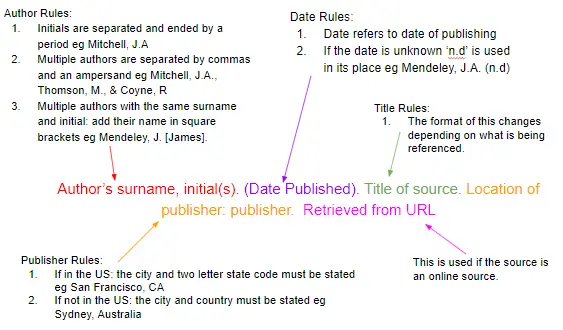
The MLA citation style is the format used by papers and manuscripts in disciplines related to the arts and humanities. The MLA citation style follows this format:
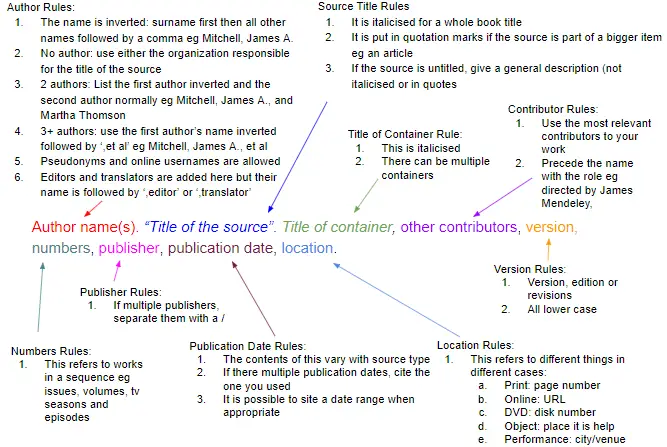
The Chicago citation style is usually used for papers related to business, history, and the fine arts. It follows this citation format:

This is a concept paper sample provided by Dr. Bernard Lango from the Jomo Kenyatta University of Agriculture and Technology (modified for use in this article). Simply click the link above the download the PDF file.
- Use simple, concise language. Minimize the use of flowery language and always try to use simple and easy-to-understand language. Too many technical or difficult words in your paper may alienate your readers and make your paper hard to read.
- Choose your sources wisely. When scouring the Internet for sources to use, you should always be wary and double-check the authenticity of your source. Doing this will increase the authenticity of your research project’s claims and ensure better data gathered during the process.
- Follow the specified format, if any. Make sure to follow any specified format when writing your concept paper. This is very important, especially if you’re writing your concept paper for class. Failure to follow the format will usually result in point deductions and delays because of multiple revisions needed.
- Proofread often. Make it a point to reread different sections of your concept paper after you write them. Another way you can do this is by taking a break for a few days and then coming back to proofread your writing. You may notice certain areas you’d like to revise or mistakes you’d like to fix. Make proofreading a habit to increase the quality of your paper.
Written by Ruth Raganit
in Career and Education , Juander How
Ruth Raganit
Ruth Raganit obtained her Bachelor of Science degree in Geology from the University of the Philippines – Diliman. Her love affair with Earth sciences began when she saw a pretty rock and wondered how it came to be. She also likes playing video games, doing digital art, and reading manga.
Browse all articles written by Ruth Raganit
Copyright Notice
All materials contained on this site are protected by the Republic of the Philippines copyright law and may not be reproduced, distributed, transmitted, displayed, published, or broadcast without the prior written permission of filipiknow.net or in the case of third party materials, the owner of that content. You may not alter or remove any trademark, copyright, or other notice from copies of the content. Be warned that we have already reported and helped terminate several websites and YouTube channels for blatantly stealing our content. If you wish to use filipiknow.net content for commercial purposes, such as for content syndication, etc., please contact us at legal(at)filipiknow(dot)net
Custom Essay, Term Paper & Research paper writing services
- testimonials
Toll Free: +1 (888) 354-4744
Email: [email protected]

Writing custom essays & research papers since 2008
40 catchy concept papers topics to amuse your prof.

It’s not easy to come around topics for concept papers that you can confidently present to your professor. However, we understand this great and urgent need, so we came up with this useful post.
What is a Concept Paper?
It is an academic paper briefly written to provide a clear summary of the research project. In short, it acts as a prelude to the primary research paper that will be presented.
Why do you need a concept paper?
Your lecturer will know what your thesis, project, or research paper is all about through your concept paper. Need I explain how long such projects are and how busy the professors are too?
In a concept paper, you develop an idea and bring it out for others to understand. Since it is short, you should master the art of using words conservatively while communicating effectively.
For example, if you are a Mass Communication student, you might want to study why fake news spreads faster than factual news. Or perhaps, you would explore why most media stations are privately owned. The list goes on to infinity.
Principles of Writing A Concept Analysis Paper
As with every type of academic paper , this, too, has its standards. Looking at a sample concept paper alone may not give you an accurate outline or writing format. That is why we have compiled these writing guidelines for you!
- The number of pages: Concept papers are typically short documents of 2-3 pages.
- Spacing: A double spacing to make the paper easy to read through
- Font size: Use a 12-point size, which is standard and readable.
- Margins: 1 inch all around is better
On top of the formatting aspects discussed above, there is also language use. Ensure that you use action-oriented language to communicate your ideas in your paper. Instead of using the statement, “could potentially help” opt for “will curtail, will certainly improve productivity, etc.”
When writing your concept paper, the following areas should be of significant focus: Arguments that address the main idea Bring out areas of controversy Point out areas of incomplete knowledge Historical and germinal works supporting your paper The composition of the concept paper should be as follows: The topic should be in the form of a question Conduct a brief overview of the research topic Briefly state the research questions that the project seeks to find answers to Why is the research necessary? A brief description of your research methodology
Let us look at a list of topic ideas for a concept paper:
Concept Paper Topic Ideas in Environment
- Are acid rains solely connected to industries and diesel vehicles alone?
- Is global warming a natural cycle of the earth?
- Can humanity benefit from forests without having to cut down trees?
- Has the coronavirus helped in reclaiming Mother Nature due to the lockdowns?
- Is humanity doing the best it can to protect endangered animal and plant species?
- Is deep-sea oil mining well for the aquatic life in the sea?
Concept Paper Topics in Health
- Have we done enough to prevent the occurrence and spread of another pandemic like COVID-19?
- Is what was considered healthy in the ancient past still considered healthy now?
- Why have there been more psychological causes of depression and anxiety during coronavirus?
- Why have African countries experienced low numbers of COVID-19 infections and death compared to Western countries?
- Why is cancer still the most dangerous disease in the 21st century?
- Is plastic surgery right for the health of the patients? Are there any side effects?
Concept Papers Ideas in Education
- Why is it a challenge to implement online learning for middle and high school students?
- What is the role of technology in enhancing research and innovations?
- Should all countries adopt the same learning curriculum for schools?
- Are long holidays proving to be detrimental to students rather than helpful?
- How much homework should a student have?
- Who is to blame for bullying cases in schools?
Concept Paper Ideas in Technology
- Why should countries adopt the 5G network?
- Are mobile companies spying on their clients?
- Why is hacking still a significant problem despite the technological advances made?
- Is it safe to use infrared and laser beams on humans?
- What is the role of technology in combating crime and terrorism?
- How can we enhance data privacy and security in the wake of mass data?
Concept Paper Topic Ideas in History
- Who is to blame for the Euthanasia project in the concentration camps?
- Is there a cold war among nations because of the I and II World War?
- Why the American flag has stars
- What are the reasons for slavery?
- Did explorers determine the sizes of countries as they are today?
- Is colonialism still persistent today?
Concept Topics in Family
- What causes divorce?
- Are children to blame for marriage break ups?
- How to live with drunken parents
- How to cope with grief in the family
- Problems associated with fostering a child
Controversial Concept Writing Topics
- Is abortion an ending of life?
- Is same-sex marriage legal?
- Should sex education be introduced in middle school?
- Children and advertising
- Surrogate mothers
We offer cheap, professional research paper writing help for college and university students. Get your paper done now!

Academia.edu no longer supports Internet Explorer.
To browse Academia.edu and the wider internet faster and more securely, please take a few seconds to upgrade your browser .
Enter the email address you signed up with and we'll email you a reset link.
- We're Hiring!
- Help Center

CONCEPT PAPER ON QUALITY EDUCATION

Related Papers
Might Kojo Abreh
In this study, School Management Committees in Akatsi South and Upper Manya Krobo of Ghana to examine their involvement and participation in school based management practices. A phenomenological approach was used to unearth four variables that links to school-based management that is carried out by SMC members. The findings of the study showed that the current state of stakeholder involvement and participation in school-based management within selected communities in these two districts are not well coordinated. Besides, school governance structures were not fully operational at their best. The work of the School Management Committees was usually left to the Chairman and in some cases to the Parent Teachers Association chair. There was a limited collaboration between the entire SMC membership and the schools they serve. Additionally, committee planning and implementation issues were significant concerns. The study recommended that SMCs be revitalised and their roles and responsibilities are unpacked for better targeting. The study also suggests changing the management activities to transform the face of activities of SMCs to improve educational provision and administration in the localities they operate. BACKGROUND OF THE STUDY
Jessica Jacobson
Joseph Attiah
Aristotle a renowned educationist once said that "those who want to teach must cease not learning." This quotation is quite relevant for the implementation of the Quality Improvement in the Primary Schools (QUIPS) programme. This sterns from the fact that a lot of barriers were identified from the education reforms in 1987 stretching from poor education systems, inadequate trained teachers, lack of infrastructure and equipment, outdated and worn out textbooks poverty and hunger in the sub-Sahara Africa which Ghana is included. The study seeks to assess the impact of the QUIPS programme in terms of teacher performance and pupils’ progress, types of interventions of the QUIPS programme, school environment and lessons learnt from the QUIPS programme for policy formulation. This cannot be achieved without a comprehensive layout of how the data would be gathered. The study focused on the fifth group of selected schools dubbed ‘Cohort V schools’ found in five districts of the three northern regions. The districts include; Lawra, Builsa, Savelugu/Nanton, West Mamprusi and Bole. Five schools were selected from each district summing up to twenty-five schools for the implementation of the programme. The study population was all teaching staff and Parent-Teacher Association (PTA) Executives in the twenty-five school communities. Questionnaire, structured interviews and general observations were used during School-Based in-service Training programmes in the various school communities and reviewed activity reports from the communities. Microsoft Access, Excel Word packages 2007 version were used to enter the data and made analysis. One major finding was that pupils cannot be expected to make appreciable gains within a two- year intervention period in the absence of accelerated programmes in literacy and numeracy. Pupils throughout Ghana were performing far below development expectations in English reading and mathematics. Two years of CRS/QUIPS interventions was simply not enough time to remedy this deficiency. Though there has been an increase in community advocacy for and contribution for quality basic education, the coverage was limited. The study therefore recommends that communities should be involved in school health; feeding, water and sanitation and introduce income-generating activities as an entry point for adult literacy. When they are well established, they would then be able to take good care of their wards. Keywords: quality education, school communities, programme, reforms, barriers, CRS/QUIPS
Alhassan Yussif
Emmanuel D O D Z I K U T O R Havi
Enrollment in basic education has made significant progress in Ghana but learning achievements appear to have stagnated. This four month project was designed to combine achievement and school resource information into a single data base and assess the degree to which particular resources were associated with better performance. Background documents were studied to assess the current context of education in Ghana. Interviews with teachers, head teachers, district education officers and other stakeholders were conducted to gauge their views on the source of the problems and possible solutions. Two districts were chosen as case studies for a more in depth analysis. The new data base provided a district-by-district snapshot of achievement and school input improvements over time by comparison to national averages for each of the 138 districts in the country. The results of the data analyses suggest that the quality of basic education is at a cross roads. The system will require new resources, including those from non-government sources. Improving student achievement will also require that new resources are allocated in new ways. Suggestions are made to USAID, other development partners and to the GOG on the content of these new directions.
Kweku Esia-Donkoh
Theresa Tantuoyir
Cice叢書5 Africa Asia University Dialogue For Educational Development Final Report of the Phase Ii Research Results Education Quality Improvement and Policy Effectiveness
BETHEL ABABIO
Curriculum Inquiry
Obed Mfum-Mensah
Complementary education programs have emerged as a useful tool for addressing the educational needs of marginalized communities in the developing world. The literature attributes the success of these complementary education programs to innovative school organization, curriculum development, and community participation. This article is based on a recent ethnographic study that explored the curriculum development process of School for Life (SFL), a complementary education program operating in northern Ghana. The objective of the study was to understand the elements of the SFL curriculum, to explore the different stages of the curriculum development process, and to investigate the stakeholders and their roles in the process. The scope of the article includes the background, the analytical framework, the context of education in northern Ghana, the SFL program, the SFL curriculum development process, and conclusion. Initially, the study revealed that the program utilized elements of both technical and critical approaches to curriculum development. The curriculum process was influenced by the context within which it occurred; the process was highly political, empowering, and emancipating for the community members who served as the major curriculum actors and decision makers.
Nana Akua Anyidoho
This article assesses the potential of rights-based approaches as a progressive devel- opment strategy by exploring the extent to which rights can be made real for people living in conditions of material deprivation and social oppression. It does so through a case study of Belim Wusa Development Agency (BEWDA), a small rights-promoting non-governmental organization (NGO) that operates among poor communities in north-east Ghana. It examines the successes of BEWDA, albeit partial and incomplete, in securing human rights, as well as the constraints and challenges faced. Findings highlight elements of a progressive development strategy, notably the focus on the agency and activism of poor and oppressed groups and their articulation of legitimate claims for rights, while also identifying the obstacles posed by the context of dual governance structures – decentralized local government and traditional authority. The research demonstrates a tension between focusing on localized struggles for human rights while the bigger picture of structural constraints and dominant power relations remains largely unchallenged.
RELATED PAPERS
Binay Pattanayak
Joseph Ghartey Ampiah
ghulam irsyad
FATAWU ALHASSAN
Raj K U M A R Dulal
MD. SHAHRIAR SHAFIQ
Shoko Yamada
Samad Chowdhory
Y P Acharya
Bhupendra Shahi
Harriet Namayega
Akanksha Marphatia
David Balwanz
Resmi P Bhaskaran
Neha Ghatak
Luis Crouch
Surashree Shome
Els Heijnen-Maathuis
James Bill Ouda
Karen Mundy
Asmita Basu
Edwin Adoga
Ephraim Nkonya , Miriam Mangheni
Shafique Virani
Douglas Koranteng
Sarva Shiksha Abhiyan, Department of School Education
Dr. Nookarapu Srinivasu
Andrews Daklo Kwame
Shivani Singh
Lindsey K. Horner , Naureen Durrani
Bill Walker
Khalid Ershad
James Onapa
- We're Hiring!
- Help Center
- Find new research papers in:
- Health Sciences
- Earth Sciences
- Cognitive Science
- Mathematics
- Computer Science
- Academia ©2024
- The Woodlands

Dr. Lindsay Whorton, Dr. Ruth Simmons, Wallace B. Jefferson at the Holdsworth 'Champions of Hope' dinner (Photo by Priscilla Dickson)
David Leebron & Y. Ping Sun at the Holdsworth 'Champions of Hope' dinner (Photo by Priscilla Dickson)
Dean Leonard Baynes, Regina Rogers, Virginia Blanton, Harris County Commissioner Rodney Ellis at the Holdsworth 'Champions of Hope' dinner (Photo by Priscilla Dickson)
Ken Sill, Kari Findley at the Holdsworth 'Champions of Hope' dinner (Photo by Priscilla Dickson)
Karl & Ann Stern at the Holdsworth 'Champions of Hope' dinner (Photo by Priscilla Dickson)
Leticia & Steve Trauber at the Holdsworth 'Champions of Hope' dinner (Photo by Priscilla Dickson)
Mickey & Dorothy Abels at the Holdsworth 'Champions of Hope' dinner (Photo by Priscilla Dickson)
Ronel Golden, Rob Kaplan at the Holdsworth 'Champions of Hope' dinner (Photo by Priscilla Dickson)
Sir Mark Haukohls, Dr. Linday Wharton at the Holdsworth 'Champions of Hope' dinner (Photo by Priscilla Dickson)
Stephen & Susan Butt at the Holdsworth 'Champions of Hope' dinner (Photo by Priscilla Dickson)
Tammy & Memo Trevino at the Holdsworth 'Champions of Hope' dinner (Photo by Priscilla Dickson)
Houston’s Holdsworth Center Recognizes a True Public Education Hero — Inspiring the Next Generation of Leaders
Charles butt's vision takes another major step.

What: The Holdsworth Center “Champions of Hope” gala
Where: The Corinthian Houston
PC Moment: Highlight of the evening was presenting Ruth J. Simmons, PhD , with the first Dr. Ruth J. Simmons Leadership in Public Education Award. The award was created in honor of her legacy as a groundbreaking leader in support of public education and a powerful advocate for students.
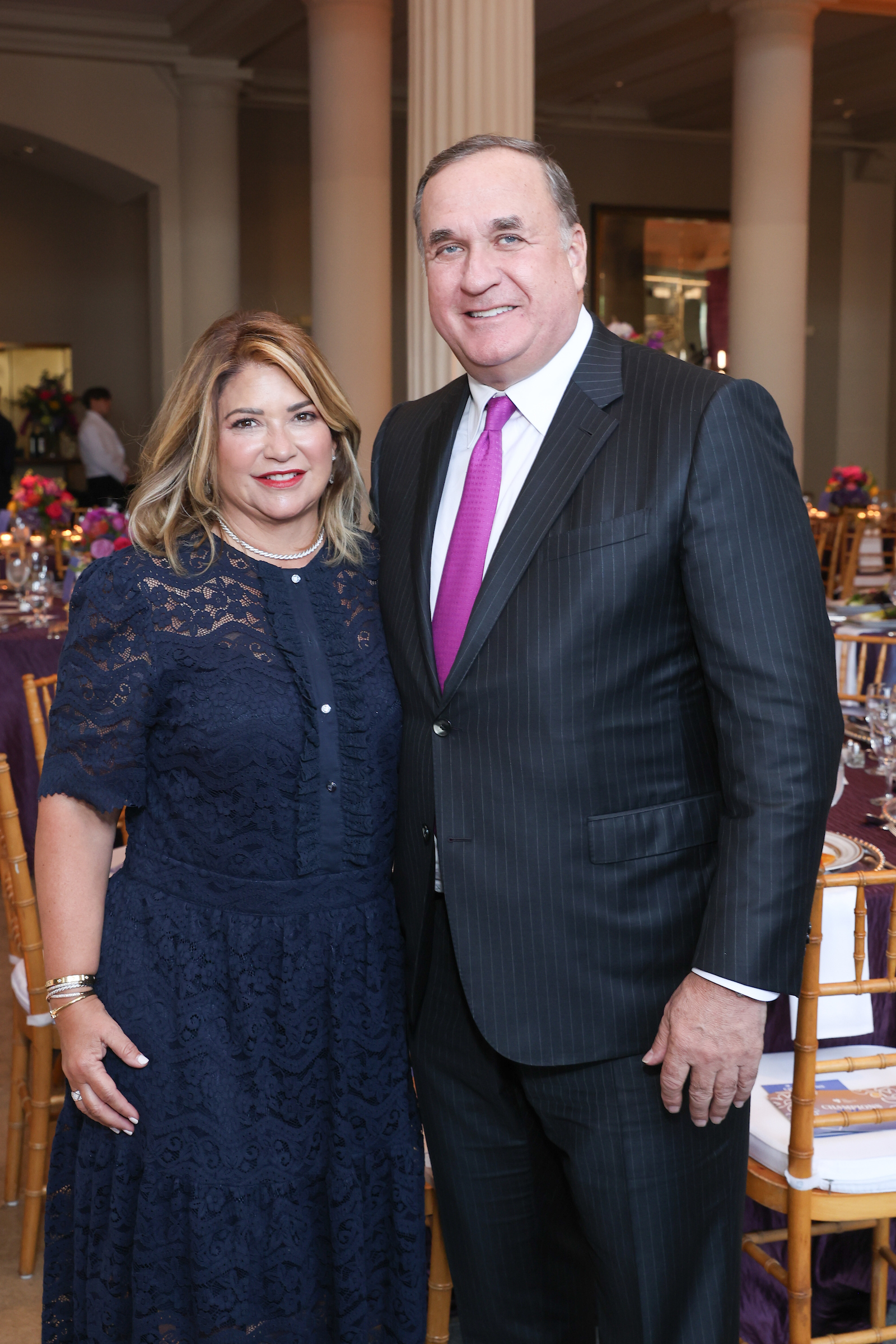
“It is a privilege to shine a spotlight on leaders like Dr. Simmons, who has such an incredible legacy of lifting up others and championing young people,” The Holdsworth Center president Lindsay Whorton, PhD, told the gathering. “Her life and career are an example to all of us.
“We hope this award will not only honor her legacy but also inspire the next generation of leaders.”
Robert Gates, PhD , former US Secretary of Defense and Holdsworth board chair, gave the keynote address while Wallace Jefferson , former Chief Justice of the Texas Supreme Court and a Holdsworth board member, served as emcee.
Gifts for Dad

The Holdsworth Center was founded in 2017 by Charles Butt with mission of building stronger leaders for Texas public schools by providing world class leadership development programs and services with basic belief in the value of public education.
The evening was presented by Goldman Sachs Gives and H-E-B. With the emphasis on the importance of public education and a mission to improve it, the turnout for the dinner was quite impressive.

PC Seen: Houston Endowment president and CEO Ann Stern and Karl Stern, Y. Ping Sun and former Rice University president David Leebron , University of Houston Law Center Dean Leonard Baynes , Texas Business Hall of Fame member Memo Treviño and Tammy Treviño , Rice University Tapia Center for Excellence and Equity in Education vice chair Ronel Golden and Rob Kaplan , philanthropists Dorothy and Mickey Ables, philanthropists Leticia and Steve Trauber , Harris County Commissioner Rodney Ellis , philanthropists Kari Findley and Ken Sill , philanthropist Regina Rogers, and philanthropist Ginger Blanton .

Featured Properties

6249 Locke Lane Houston, TX

4413 Verdome Lane Houston, TX

3500 Audubon Place Houston, TX

16835 Fowler Pines Drive Humble, TX

734 E 13th 1/2 Street Houston, TX

5722 Cheltenham Drive Houston, TX
_md.jpg)
2047 Westcreek Lane #807 Houston, TX

1505 Early Lane Houston, TX

1405 Dart Street Houston, TX

1205 Nantucket Drive Houston, TX

4013 Ella Lee Lane Houston, TX

951 W 21st Street Houston, TX

12634 Briar Patch Road Houston, TX

3838 Olympia Drive Houston, TX
_md.jpg)
4038 Woodshire Street Houston, TX

18718 Luby Creek Drive Cypress, TX

6261 Del Monte Drive Houston, TX

18 Bayou Shadows Street Houston, TX

6026 Lake Bridge Lane Manvel, TX

701 Bering Drive #1905 Houston, TX

3825 Juniper Meadows Lane Spring, TX

1203 Nantucket Drive Houston, TX

12611 Cove Landing Drive Cypress, TX

10038 Briar Drive Houston, TX

5429 Denmark Street Houston, TX

3023 Wellspring Lake Drive Fulshear, TX

4625 Crawford Street Houston, TX

331 Tealwood Drive Houston, TX

26407 Hollow Stone Lane Cypress, TX

Like PaperCity Dallas on Facebook
Beyond the magazine. Get more of Dallas’ top restaurant, real estate, society, fashion and art in your news feed.
Create a free account to save your favorite PaperCity content in one curated collection.
Email Address *
Password *
Create Account
Already have an account? Login
Login to your account
Remember me
Lost your password?
Don't have an account? Create Account
Create a free account to view all PaperCity recipes. Save all of your favorite content in one curated collection.
Get PC Daily delivered directly to your inbox – don't miss anything!
Search PaperCityMag.com

COMMENTS
In this concept paper we describe a framework (a 3 x 3 model of 21st-century learning) for guiding our discussion on the substance of STEM education. This framework is based on research conducted by and reported in Kereluik, Mishra, Fanhoe, & Terry (2013). Further details are provided in the end notes. In this concept paper we describe this ...
A concept paper primarily focuses on introducing the basic idea, intended research question, and the framework that will guide the research. Purpose of a Concept Paper. A concept paper serves as an initial document, commonly required by private organizations before a formal proposal submission. It offers a preliminary overview of a project or ...
follow these steps: 1. Concept paper title. Every pa per must have a title and concept paper is not left out as one needs to have a title that. summarizes what the paper is about. The title should ...
A concept paper is a short document written by a researcher before starting their research project, with the purpose of explaining what the study is about, why it is important and the methods that will be used. The concept paper will include your proposed research title, a brief introduction to the subject, the aim of the study, the research ...
Funders that request concept papers often provide a template or format. If templates or formats are not provided, the following can serve as a useful concept paper structure. THE FIVE ELEMENTS OF A CONCEPT PAPER 1. The first section, the Introduction, identifies how and where the applicant's mission and the funder's mission intersect or align.
to interest potential funders. to develop potential solutions or investigations into project ideas. to determine whether a project idea is fundable. to serve as the foundation of a full proposal. Funders that request concept papers often provide a template or format. If templates or formats are not provided, the following can serve as a useful ...
1. To explore and expand an idea: Researchers can use concept papers to transform an incipient research idea into a focused, high-quality study proposal. The paper is also a means to obtain feedback that can be used to strengthen a detailed proposal at a later stage. 2. To draw the interest of funding agencies: Through an effective concept ...
A concept paper is often used to generate feedback and guidance from a program officer before a full grant proposal is developed. In most cases, the program officer will be, or will have been, a researcher, clinician, or scholar, like yourself. Before you start writing, think about the Golden Rule and the kind of project summary you'd like to ...
Preparing a Concept Paper for Funded Research 3 Originally prepared by the College of Education Research Coordinator with much appreciation from C3 Consider and incorporate the Research Coordinator's suggestions. Share this first iteration of your concept paper with research colleagues, including colleagues at Texas State and other
Concept Paper vs. Research Proposal. Getting Started on Your Concept Paper. 1. Find a research topic you are interested in. Tips for finding your research topic. 2. Think of research questions that you want to answer in your project. 3. Formulate your research hypothesis.
Transformative Education is a central concept in Oxfam IBIS' Education for Change Strategy, where it is defi ned as follows: 'Transformative education empowers learners and enables them to constructively consider multiple viewpoints and perspectives in dialogue with others and gives them the skills to engage in social actions'.
Concept paper: Early Childhood Education and Care Context Early childhood education and care (ECEC), as defined by UNESCO, is the "holistic development of a child's social, emotional, cognitive and physical needs in order to build a solid and broad foundation for lifelong learning and wellbeing." Extensive academic
Concept Paper (Revised) - Free download as Word Doc (.doc / .docx), PDF File (.pdf), Text File (.txt) or read online for free. This document discusses the use of technological tools and social media platforms to develop effective instructional materials during the COVID-19 pandemic. It aims to identify the impact of these tools on material development and differentiate online from traditional ...
This concept paper explores the top five current approaches and methods used in English Language Teaching (ELT). With the growing importance of English as a global language, the demand for ...
Children and advertising. Surrogate mothers. We offer cheap, professional research paper writing help for college and university students. Get your paper done now! Our professional writers have put together a list of 40 concept papers topics to stir your imagination. Let your titles attract readers today.
Oxfam IBIS Concept Paper: Education and Gender, version 1, March 1st, 2017 This series of concept papers was introduced June 1st, 2014 with the target audience being Oxfam IBIS staff and management as well as partners and stakeholders. The papers have been developed through a participatory process and are living documents to be revised whenever ...
CONCEPT PAPER ON QUALITY EDUCATION Empowerment for Life (E4L) has a holistic approach to education in particular and to development as a whole. By holistic, it means looking at the whole human being (psychologically, intellectually, physically and morally). This is important when pursuing a relevant and meaningful learning situation in life.
The Five Elements of a Concept Paper. The first section, the Introduction, identifies how and where the applicant's mission and the funder's mission intersect or align. It addresses the reasons why this funder should support projects in this general area. It also introduces the applicant's partners and shows why the partners want to ...
2 CONCEPT PAPER: YOUTH EDUCATION & TRAINING. JUSTIFICATION. Today's generation of youth is the largest in history, with nearly half of the world's population of 7 billion under the age of 25. Of these, more than 90% live in low income countries and fragile contexts. Young people are future citizens and only through formal and non-formal ...
Concept Paper about Education - Free download as Word Doc (.doc / .docx), PDF File (.pdf), Text File (.txt) or read online for free. The document discusses the concept of education. It notes that education is often confused with schooling, but that true education involves helping people learn rather than just drilling information into them. The document then lists several research questions ...
Concept Paper on the The K to 12 Basic Education Curriculum Framework - Free download as Word Doc (.doc / .docx), PDF File (.pdf), Text File (.txt) or read online for free. The Philippines launched its "K to 12" program in 2012, a comprehensive reform of basic education. It is catching up with global standards in secondary education through this reform and attaching high value to the kindergarten.
Education an struggle: the impact of the new online learning system of education on students education is said to change the world, but what is to happen if the ... Concept Paper - Education. Course: Technical Writing (EL 66) 44 Documents. Students shared 44 documents in this course. University: Cagayan State University. Info More info. Download.
CONCEPT PAPER. Building a framework to decolonize global emergency medicine. Monalisa Muchatuta MD MS, ... These power imbalances yield disparities in GEM practice, research, and education. Approach. The Global Emergency Medicine Academy (GEMA) of the Society for Academic Emergency Medicine formed the Decolonizing GEM Working Group in 2020 ...
Over the last two decades, numerous studies have highlighted the significance of integrating sustainability into higher education. Consequently, there has been a growing interest in the literature on engineering education for sustainable development, emphasizing the inclusion of this concept within engineering curricula and recognizing the pivotal role that engineers play in achieving the ...
PC Moment: Highlight of the evening was presenting Ruth J. Simmons, PhD, with the first Dr. Ruth J. Simmons Leadership in Public Education Award. The award was created in honor of her legacy as a ...
This paper advances multidisciplinary research, policy, education and activisms which cohere around the concept of the 'water-energy-food (W-E-F) nexus' via an evidence-led critique of normative forms of nexus-thinking which draws upon research with 3705 diverse young people's (aged 10-24 years) W-E-F experiences in SE Brazil.
The purpose of this research is to investigate the concept program of moderate Islamic education at Yayasan Nur Ibrahimy, the integrated schools of SMK Madani and SMA Muhammadiyah 10 Rantauprapat, including the steps, obstacles, support, and efforts involved. This research utilized a qualitative method and was conducted at Senior High School Nur Ibrahimy, the integrated school of SMK Madani ...